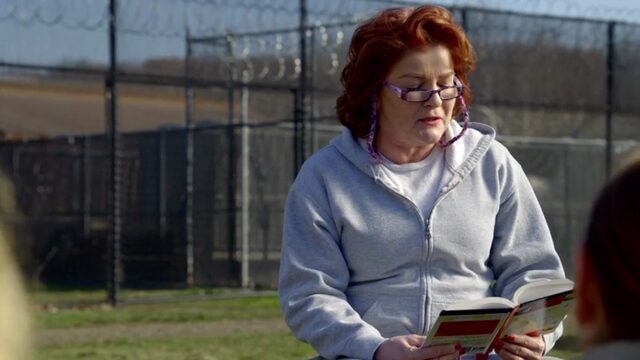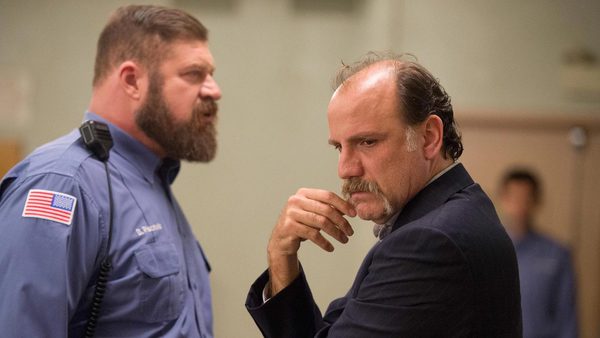Good lord, Orange Is the New Black really didn’t let us off the hook when it came to Poussey, did it?
The flashback is nothing short of beautiful. Samira Wiley does some of her best acting all season, her guileless smile more beatific than ever. Where the show really succeeds is in not showing us the crime that landed her in Litchfield. That’s now how we’re supposed to remember Poussey. Instead, we see the woman: loyal, sarcastic, fun. She spends all night searching New York for her friends, which leads to some of Orange’s best set pieces this season. There’s the drag queen night club, so awash in color that it looks almost roto-scoped; the parade of monks (actually members of Improv Everywhere), with LED lights on their bicycle tires; and – simply, beautifully – the New York skyline. It’s a fitting farewell to a dearly departed character, and it shows just how big the world is outside the walls of the prison.
Because in the prison, what is Poussey? She is a body draped under a sheet, one the guards haven’t even deigned to move, letting the cook staff see it in all its grisly, blunt reality. And, most nauseatingly, she’s a talking point for MCC. Before the cops have even been called, the guys from MCC are digging through Poussey’s prison record and social media accounts, looking for some way, any way, to spin her as a violent inmate. The fiction spreads like a disease through the ranks of the guards: Humphrey tries to bring in a gun strapped to his ankle, and Dixon and Stratman let him. MCC can’t find anything on Poussey, so they shift the blame to Bayley, alighting on a picture of him dressed up like Rambo as their smoking gun. “Toast Can’t Never be Bread Again” isn’t OITNB‘s most graphic installment, but it might be its grossest yet.
And the worst part about this MCC debacle is that it ropes Caputo in as well. In one of the episode’s greatest heartbreaks, he gives a live press conference in which he has the chance to lay the blame at the feet of the untrained, sadistic guards, or the unfeeling corporation that lets them run roughshod over Litchfield. Rather than that, though, he announces that Bayley is only suspended, and most devastatingly, he doesn’t even say the name Poussey Washington. It’s sickening, for many reasons, chief among them the feeling of betrayal.
Nick Sandow has given an Emmy-worthy performance this season, expertly navigating the twists and turns of Caputo’s moral conflict. He’s the man who will give the picture of Sophia to Danny, but he’s also the man, who, when it matters most, will toe the company line. In one of Orange‘s best, and most believable, sequences, this starts a full-blown riot, with Taystee storming out of Caputo’s office, knocking shit over, and crying “They called him a victim! They didn’t even say her name!” (Danielle Brooks needs to start drafting an Emmys speech too.)
Look, a lot happened this episode, and in this season, but ever since Blanca stood on that table, everything has been leading to this. The inmates storming the halls, coalescing in the center; the guards outnumbered; Humphrey losing his gun; Daya picking it up and pointing it at his head. Director Adam Bernstein, who in the past has done fine work on Breaking Bad and Fargo, shoots the final cliffhanger in a circling shot that should be gimmicky and disorienting, but instead reminds the viewer just how fucked up everything got this season. It’s a powerful end to a powerful season, one that Orange Is the New Black will try very, very hard to top. But after season four, is there any doubt the show can deliver? This is some of the year’s best television, and it is not to be ignored.
A Few Thoughts
- In my last review I referred to Sanky as Brandy. Consider this a correction.
- I love how the show handled Coates. After raping Doggett, he could have been just another villain in a uniform, but his transformation, and desire to better understand himself, was never less than believable. (Kudos to James McMenamin.) His final scene with Doggett was maybe his best, when he admitted that he still felt the untethered desire that led him to assault her in the first place. It’s this scene that the episode gets its title, which refers to the culture and atmosphere of Litchfield in general, but also to individuals like Coates. And Doggett, for that matter. You can’t go back to being the un-burned version of yourself.
- “He was also a henchman.” Alex, on Ian.
- The scary thing about the COs is that any of them – Piscatella, Humphrey, Dixon, Stratman – could be the primary antagonist on a prison show. There are four of them on Orange Is the New Black.
- Blanca seems to be the only mourner who Watson doesn’t hate: “That bitch could stand for a hella long time.”
“Toast Can’t Never be Bread Again” score: 4.5/5
Orange Is the New Black season 4 score: 4.5/5


